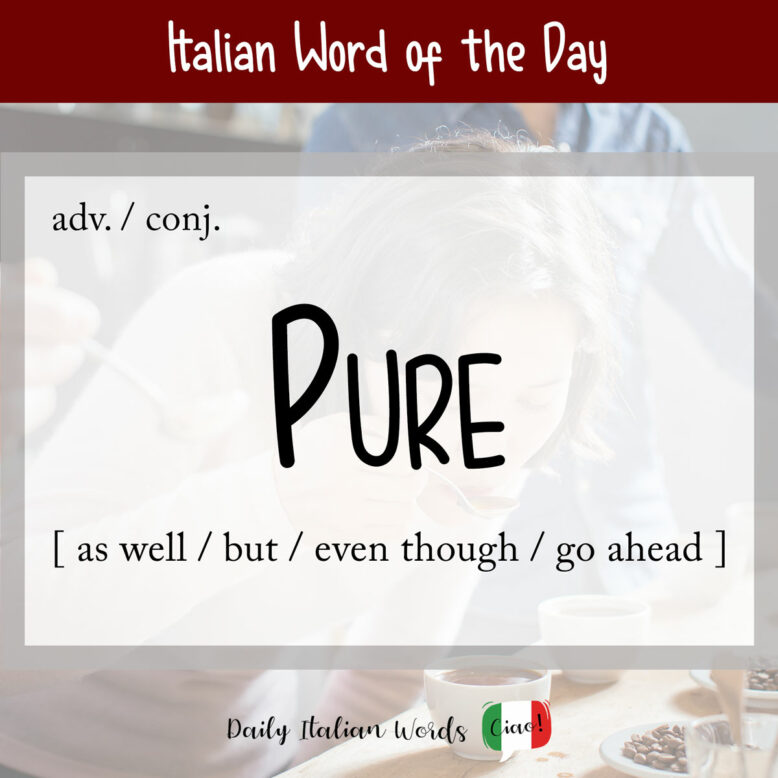Today, we’re going to explore one of the most quintessentially Italian words: the adverb and conjunction pure. Like many words in this grammatical category, it has a broad range of translations in English, making it challenging to master in the early stages of learning the language. Let’s see if we can break it down and simplify it!
pure
as well / but / even though / go ahead
Important: The word pure has nothing to do with the English adjective pure, although both terms do ultimately derive from the Latin pure, meaning purely or merely.

‘Pure’ the Adverb
1. Too, as well, also
In affirmative clauses, pure can be used as an adverb meaning too, as well, or also. A common synonym for pure is anche.
- Pure Alessio può venire. = Alessio can come as well.
- Abbiamo mangiato la pizza e pure il gelato. = We had pizza and gelato too.
- Aspettate ragazzi, vengo pure io. = Wait guys, I’m coming too.
- Mi è piaciuto quel film. – Pure a me. = I liked that film. – So did I.
However, unlike the more neutral anche, pure carries a slightly more emotional nuance. In fact, it is often used when something contradicts your expectations. Using pure can help convey your surprise, as in the following sentence:
Elia conosce l’inglese, il francese, l’italiano e pure il gallese!
Elia knows English, French, Italian, and Welsh as well!
(But if we want to express the surprise that pure communicates, a better translation might be “Not only does Elia know English, French, and Italian, but he also knows Welsh!”)
In negative clauses, the best translation is either.
- Pure Alessio non può venire. = Alessio can’t come either.
- Pure io non ne capisco niente. = I don’t understand it either.
2. Go ahead, by all means, be my guest, please, feel free
In English, we use expressions such as go ahead, feel free, by all means, please and be my guest in order to say that someone is welcome to do or take something. In Italian, these can all be replaced by pure.
- Vieni, entra pure! = Please come in!
- Mandami pure una mail quando hai tempo. = Feel free to send me an email when you have time.
- Prendine pure uno. = Go ahead and take one.
- Se vuoi rovinarti la vita fallo pure. = If you want to ruin your life, be my guest.
3. Emphasis
Pure is frequently used to add emphasis to a phrase, often with an exhortative tone. Although it doesn’t have a direct translation, the undertone it conveys is an unspoken “Come on!” or “It’s so obvious!” In this case, you will often see it shortened without the “e” at the end.
- Te l’avevo pur detto! = I told you so!
- Bisogna pur campare! = You have to live!
Bisognerà pur dirglielo.
We’ll have to tell him though.

‘Pure’ the Conjunction
1. But, yet, however
This usage of pure is less common in speech compared to other conjunctions. In fact, it has largely been replaced by eppure, which is the combination of e (and) and pure.
- Non ha tanti soldi, (ep)pure non si lamenta mai. = He doesn’t have much money, but he never complains.
Mario è giovane, (ep)pure è già diventato medico.
Mario is young yet he is already a doctor.
2. Even though, even if
By shortening pure to pur and following it with a verb in the gerund, the meaning shifts to even though or even if. This usage is more literary than spoken.
- Pur non volendolo, ho dovuto smettere di correre. = Even though I didn’t want to, I had to stop running.
- Pur volendo, non potrei mai aiutarlo. = I wouldn’t be able to help him even if I wanted to.
- Pur essendo un bravo cantante, non ha avuto successo. = Even though he was a good singer, he never had success.
Pur non sapendo l’italiano, lavora a Torino da sei anni.
Even though he doesn’t know Italian, he has worked in Turin for six years.
3. In order to, so as to, just to
Pure can also mean in order to, so as to or just to when truncated and paired with the preposition di.
- Anna farebbe di tutto pur di vederlo felice. = Anna would do anything just to see him happy.
Darei qualsiasi cosa pur di vederla ancora una volta.
I would give anything just to see her again.

Heather Broster is a graduate with honours in linguistics from the University of Western Ontario. She is an aspiring polyglot, proficient in English and Italian, as well as Japanese, Welsh, and French to varying degrees of fluency. Originally from Toronto, Heather has resided in various countries, notably Italy for a period of six years. Her primary focus lies in the fields of language acquisition, education, and bilingual instruction.


